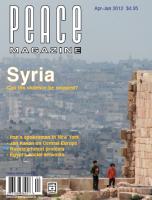
Peace Magazine Apr-Jun 2012, page 4. Some rights reserved.
Search for other articles by Metta Spencer here
As we enter spring, the weather is already hot and so is the international climate. If a year ago we were elated by the nonviolent struggles in Tunisia and Cairo,we cannot be so hopeful about later aspects of the Arab Spring. The media’s two top worries now are the violence in Syria and the ambiguity as to whether Iran is developing nuclear weaponry and what to do about it.
It is possible to oust a powerful dictator, but the more powerful he is, the more careful and incremental the nonviolent resistance must be. Alas, there was insufficient preparation and even less commitment to nonviolence in most of the Arab countries—especially Syria. When pro-democracy activists take up arms against their oppressor, they are using the very method in which that ruler has the advantage. And indeed, Bashar al-Assad’s army now seems to be crushing the resistance. René Wadlow’s article depicts the unpromising prospects for ending that violence.
The second problem is Iran. Israel’s leaders want Obama to support their bombing of Iran’s nuclear installations. US intelligence sources say that Iran has not yet decided to build the bomb, but if they do progress in building one, Obama will support Israel. However, Israel wants to prevent Iran from acquiring even the capability to build such a bomb.
To assess reality, we decided to ascertain what Iran’s official spokesmen say. Here we present Charlie Rose’s interview of Mohammad-Javad Larijani,who said that what Iran wants is just the capability, not the bomb. Presumably that would be okay with Obama but not with Netanyahu.
Still, what would peace activists do in this situation? In a nuclear-weapon-free world, we’ll need IAEA mechanisms for inspecting and enforcing compliance. But it is sheer hypocrisy for the US and Israel to criticize any other country for seeking the kind of weapons that they themselves retain. The world needs a clean slate—and we can get that by creating a Middle East Nuclear Weapon Free Zone, starting this year.

Peace Magazine Apr-Jun 2012, page 4. Some rights reserved.
Search for other articles by Metta Spencer here